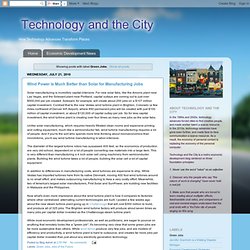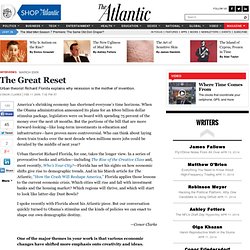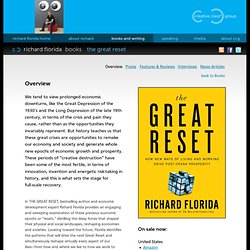

Food Freedom. Use These 4 Cheap, No-Nonsense Ideas - Paul Kedrosky - Business. What's the single best idea to jumpstart job creation today? It is easy to get cynical about job creation. There are, after all, many incoherent policy suggestions about dealing with the worst job market in the U.S. since the Depression. However, they range along a continuum between "do anything" and "do nothing", with brief forays into self-serving tax policy. It is wearying and nihilism-inducing. Short of simply becoming cynical about the whole thing, what can be done?
• Give every foreign graduate student in a U.S. science, technology, engineering, or mathematics program a work visa. . • Make healthcare more portable and entrepreneur-friendly. . • Fix the many goofy laws hampering entrepreneurs. . • Benchmark U.S. states in terms of ease and cost of company creation. These are just a few of things we could to drive U.S. job creation. Follow the debate here. The Next Hundred Million: America in 2050 (9781594202445): Joel Kotkin.
Houston Strategies. Green Jobs. In a recent editorial, George Will dismissed global warming as academic nonsense.

There is some truth to what he says regarding tactics of those trying to scare everyone about global temperature increases. Particularly the forced "consensus" and the constantly shifting story. But there is little debate, even among Republicans, that SOx and NOx (sulfur dioxide and nitrogen oxide) emissions are harmful to your health. Sort of like how few people will argue that smoking won't harm your lungs. Clean coal technology and the natural gas building spree of the 90s have helped reduce the levels of these harmful pollutants in the atmosphere over the last 20 years.
In the 70s, there was a panic about global cooling, with the conventional academic wisdom claiming that pollutants were blocking the sun's rays. So I don't have any argument with Will regarding the tactics used by global warming/climate change zealots. Wind accounts for about 20 times the U.S. electrical output as solar.
Future Hi: Bucky Fuller - Grunch of Giants. New Geography - Forbes. The Great Reset - Magazine. Urban theorist Richard Florida explains why recession is the mother of invention.

America’s shrinking economy has shortened everyone’s time horizons. When the Obama administration announced its plans for an $800 billion dollar stimulus package, legislators were on board with spending 75 percent of the money over the next 18 months. But the portions of the bill that are more forward-looking—like long-term investments in education and infrastructure—have proven more controversial.
Who can think about laying down train tracks over the next decade when millions more jobs could be derailed by the middle of next year? Urban theorist Richard Florida, for one, takes the longer view. I spoke recently with Florida about his Atlantic piece. —Conor Clarke One of the major themes in your work is that various economic changes have shifted more emphasis onto creativity and ideas. I think the crisis concentrates and accentuates a few long-running trends.
And you cite Ed Glaeser as well. And why won’t it? Richard Florida's Books. Overview We tend to view prolonged economic downturns, like the Great Depression of the 1930’s and the Long Depression of the late 19th century, in terms of the crisis and pain they cause, rather than as the opportunities they invariably represent.

But history teaches us that these great crises are opportunities to remake our economy and society and generate whole new epochs of economic growth and prosperity. These periods of “creative destruction” have been some of the most fertile, in terms of innovation, invention and energetic risk-taking in history, and this is what sets the stage for full-scale recovery. In THE GREAT RESET, bestselling author and economic development expert Richard Florida provides an engaging and sweeping examination of these previous economic epochs or “resets,” distilling the deep forces that shaped their physical and social landscapes, reshaping economies and societies. We’ve weathered tough times before.